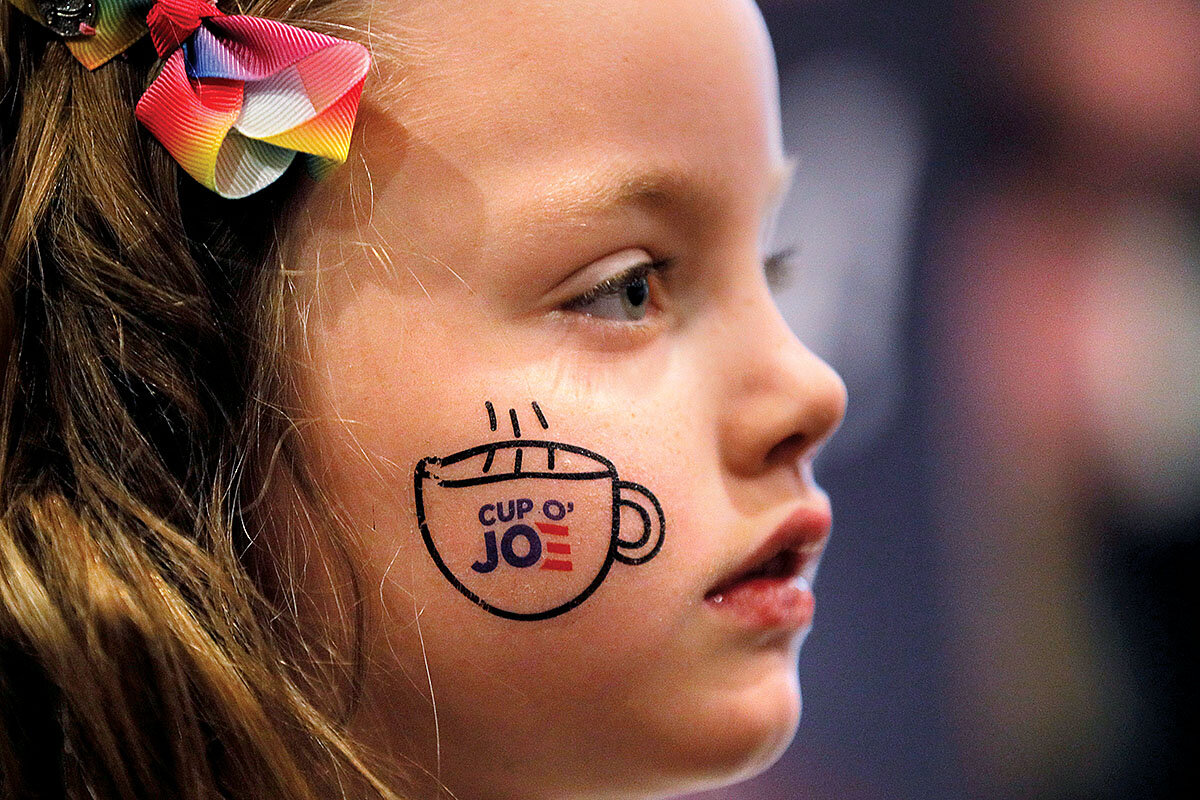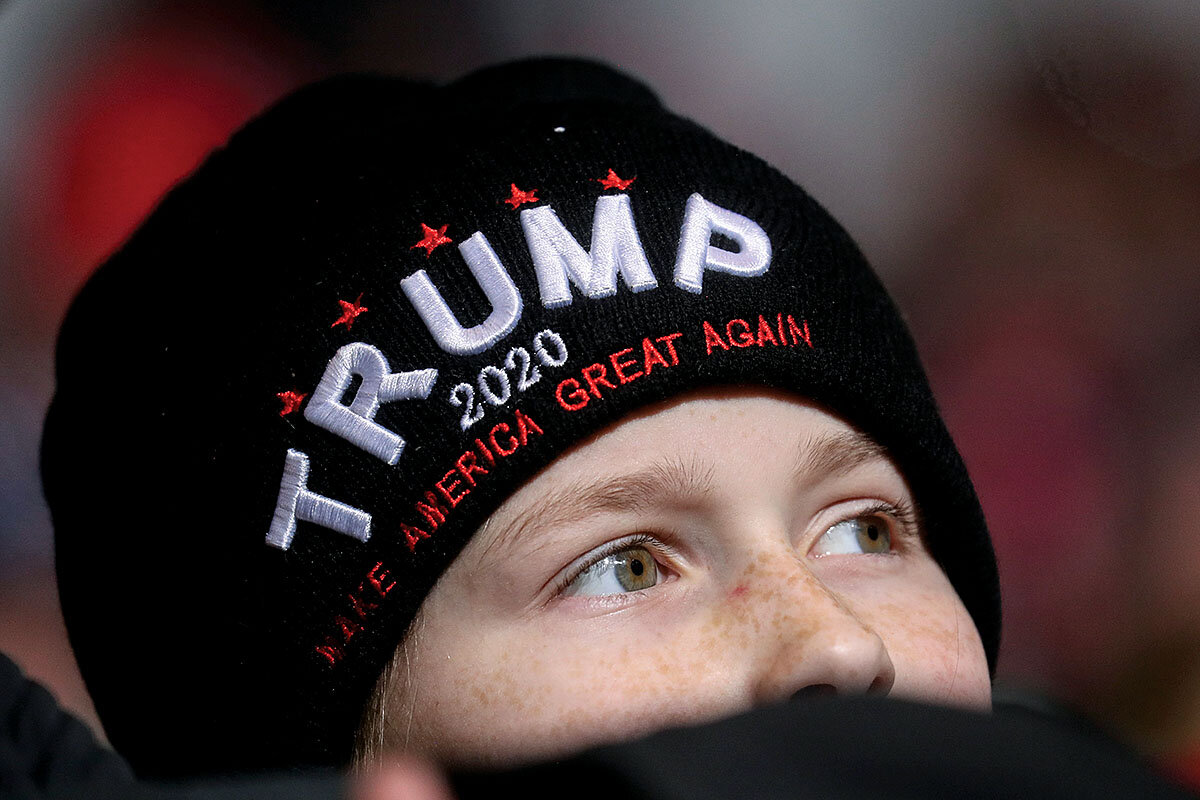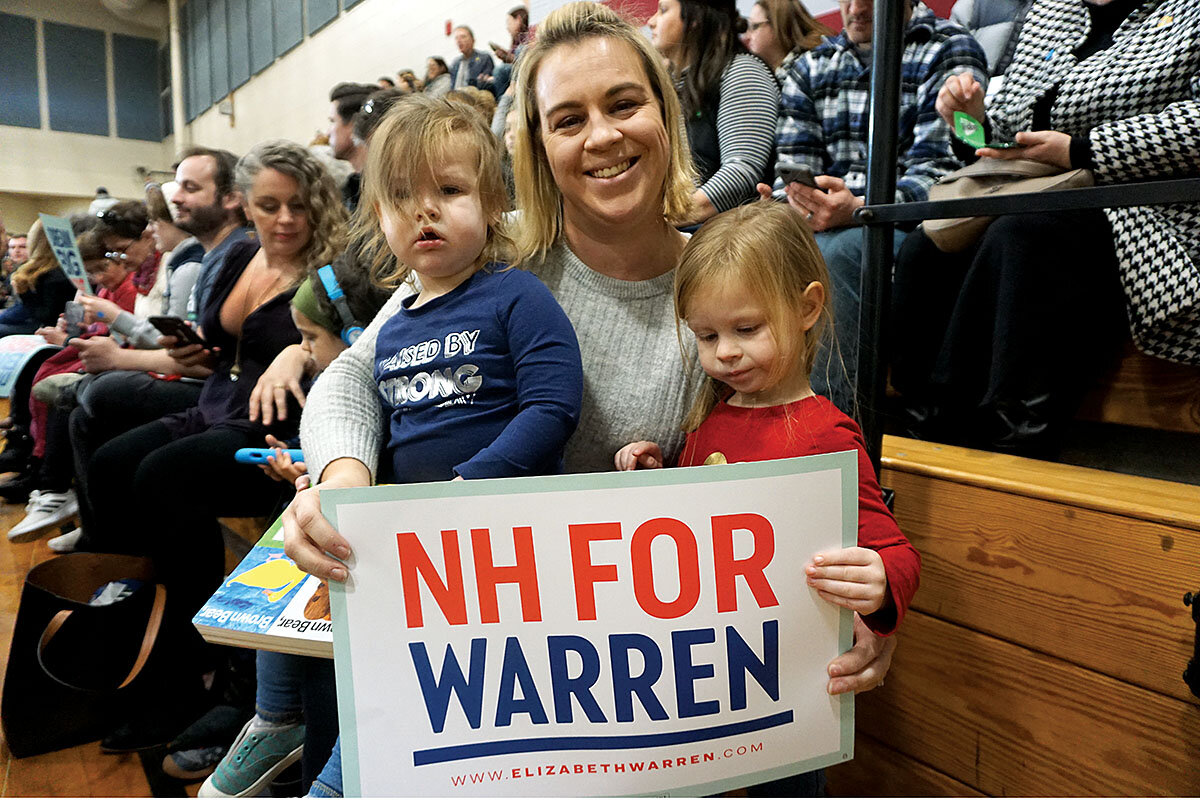In 2020, parents weigh how to talk politics
Loading...
| Boston; and Manchester, New Hampshire
Minutes before Elizabeth Warren’s arrival at a recent campaign stop in Manchester, New Hampshire, a political enthusiast sitting in the packed bleachers of a gymnasium recounts a previous time he asked the Democratic presidential candidate a question.
“I asked her about better public school education, because in Detroit, and some other places, public schools aren’t doing well,” the young man explains.
He is 10 years old.
Why We Wrote This
What role should politics play in the lives of children? With polarizing discussions happening daily in the United States, adults increasingly have to decide when and how much to talk about candidates and issues with young people.
The erudite elementary schooler’s political passions run from the accomplishments of his favorite presidents to sharing opinions about Republicans and supporters of President Donald Trump – the latter bringing a gentle rebuke from his mother.
Sonia Almeida, who is a member of New Hampshire’s Bedford Democrats, appreciates her son’s enthusiasm. But she says she and her husband have struggled with supporting his interests within a political atmosphere that contains “so much negativity.”
“I’m trying to fight for my kid’s future and [get] back to a world of civility,” she says.
Across the nation, parents of all political persuasions are grappling with how to shepherd their children through the contentious 2020 election cycle. Some mothers and fathers involve their offspring in electioneering because they wish to pass along deeply held values. Others want to shield their kids from increasingly rancorous competition between parties. At a time when politics pervades so many areas of life – encroaching even into playground talk – parents are weighing the balance between helping children understand the adult concerns they’re being exposed to and protecting the innocence of childhood.
“We inhabit a highly politicized environment and many parents no longer want to shelter their children. Rather, many treat their children as conversation partners and, in some cases, as bearers of their values,” says Steven Mintz, an expert on the history of the family at the University of Texas at Austin.
Starting them young
Many parents are weaning kids on politics. Niki Campbell’s 2-year-old daughter may still be in diapers, but she already has her own miniature “Bernie 2020” T-shirt. Standing in a parking lot outside a Bernie Sanders rally in Franklin, New Hampshire, Ms. Campbell explains, “I really want to get her involved in politics while she’s young. Kids have a much bigger voice than they’re given credit for.”
Over the past decade, the publishing industry has overseen a spike in political children’s books. Young readers have the option of titles such as “Donald Builds the Wall,” or bestsellers like “A is for Activist.” Indeed, activism is a trait for which Generation Z is known. Issue-driven teens such as Swedish climate change activist Greta Thunberg and high school shooting survivors David Hogg, Emma González, and Kyle Kashuv became household names before they could cast a vote. Schoolchildren regularly participate in gun control, climate change, and “close the camps” marches.
Parents are driving their kids to rallies, helping them make protest signs, and enlisting them for door-to-door campaigning. But some observers see a downside to this type of well-intentioned evangelism.
“My personal worry is less about preserving children’s vaunted innocence than whether we are allowing our children to develop an autonomous identity and the opportunity to grow up at their own pace and to define their own values,” says Mr. Mintz.
Ron Meyer, from Loudoun County, Virginia, would like to introduce his infant and toddler to politics at a young age but he’s wary of exposing them to the jading influence of national politics. He says kids should be taught instead about local government matters first.
“What you should start your children with is actually the government services that impact them the most. ... Who runs your school system? How does that function?” says Mr. Meyer, who was elected to his county’s board of supervisors and has run for state office as a Republican. “I wouldn’t really want to engage my kids in national politics until they’re in high school” and can think more independently.
Filling the void
In our media-saturated age, children are picking up political tidbits from all over and in ways that parents may not be fully aware of. Politics play out in the background of adult lives – whether it’s news radio, podcasts in the car, or TV news while preparing dinner, note Stewart Friedman and Alyssa Westring, authors of the forthcoming book “Parents Who Lead.” The authors advocate becoming more aware of this low-level noise around children – who often jump to their own conclusions.
In a recent wide-ranging study of children’s reactions to the 2016 U.S. presidential election, researchers discovered that a quarter of participants between ages 5 and 11 believe it’s against the law for women to be president. Their rationale was based on their observation that no women had been elected to the White House, says Christia Spears Brown, a professor of developmental psychology at the University of Kentucky and a co-author of the 2019 study “Toward a Developmental Science of Politics.”
“We asked them why they thought women had not been president,” she says. “A lot of them said because women wouldn’t want the job, they would want to stay home, they wouldn’t be good leaders. And so what we also see is that in the absence of parents talking to kids about it, kids are coming up with their own explanations that probably parents would be horrified to hear.”
More than 90% of interviewees in the study’s sample from Kansas, Kentucky, Texas, and Washington state expressed a preference for either Mr. Trump or Hillary Clinton. The researchers were struck by children’s negative perceptions of the candidates, compared with previous years. Beyond disagreeing with their policies, they viewed candidates as fundamentally bad people. Children tended to reflect their parents’ politics and the voting patterns of their community, but researchers say only about 20% of the kids in the sample said their parents talked with them about the election a lot
Different approach?
A new political environment may require a different tack than in previous generations.
“When I was a kid, my parents wouldn’t tell me who they voted for,” says Erin Pahlke, psychologist at Whitman College in Walla Walla, Washington, and a co-author of the 2019 study. “They would talk about politics in general. But they were really careful. They did not tell me what they thought of different politicians. And although I can understand where folks are coming from on that, I think right now that kids need some help thinking through the different politicians’ perspectives and the different policies.”
Today’s parents may need to set aside time for non-distracted talk about politics, experts say. “Begin by defining what you value as a family,” write Mr. Friedman and Ms. Westring via email. “Rather than defining yourselves by a particular political party, define yourselves by the values you cherish. Rather than focus on why you don’t like a particular person, focus on why their choices aren’t aligned with your values.”
At the Warren event in Manchester, Erin Columbare hopes the communal gathering offers a positive political experience for her two daughters, who are nearly 2 and 4, sitting next to her on the bleachers.
“I think the real root in politics is wanting to make a change in your community, in your country, in your world,” says Ms. Columbare, before turning to her older daughter and asking, “What did we say we were going to do in the car today? Are we going to change the...?”
“World!” her daughter exclaims.










